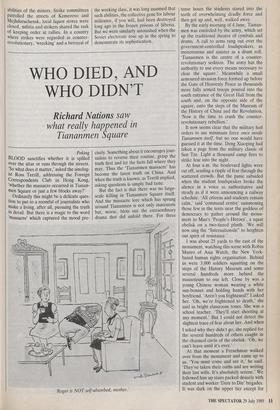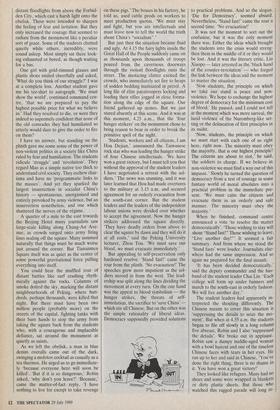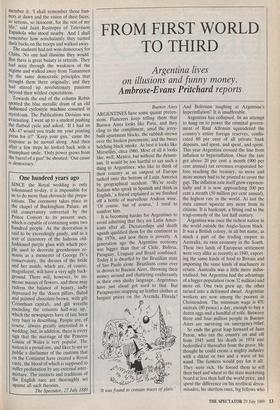WHO DIED, AND WHO DIDN'T
Richard Nations saw
what really happened in Tiananmen Square
Peking BLOOD sanctifies whether it is spilled ever the altar or runs through the streets. `So what does it matter,' asked the sinolog- ist Ross Terrill, addressing the Foreign Correspondents Club in Hong Kong, 'whether the massacre occurred in Tianan- men Square or just a few blocks away?'
• Ordinarily this might be a delicate ques- tion to put to a roomful of journalists who make a living, after all, pursuing the truth In detail. But there is a magic to the word 'massacre' which captured the mood pre- cisely. Something about it encourages jour- nalists to reverse their routine, grasp the truth first and let the facts fall where they may. Thus the `Tiananmen massacre' has become the latest truth on China. And when the truth is known, as Terrill implied, asking questions is simply bad taste. But the fact is that there was no large- scale killing in Tiananmen Square itself. And the massacre lore which has sprung around Tiananmen is not only inaccurate but, worse, blots out the extraordinary drama that did unfold there. For three
'Roger is NOT self-absorbed, mother.'
tense hours the students stared into the teeth of overwhelming deadly force and then got up and, well, walked away.
By the early morning of 4 June, Tianan- men was encircled by the army, which set up the traditional theatre of cymbals and drums. A call to arms rang out over the government-controlled loudspeakers, as monotonous and sinister as a drum roll. `Tiananmen is the centre of a counter- revolutionary sedition. The army has the authority to use every means necessary to clear the square.' Meanwhile a small armoured invasion force formed up before the Gate of Heavenly Peace as thousands more fully armed troops poured into the south entrance of the Great Hall from the south and, on the opposite side of the square, onto the steps of the Museum of the History of China and the Revolution. 'Now is the time to crush the counter- revolutionary rebellion.'
It now seems clear that the military had orders to use minimum force once inside Tiananmen itself, but no one would have guessed it at the time. Deng Xiaoping had taken a page from the military classic of Sun Tze. Light a thousand camp fires to strike fear into the night.
At four a.m. the boulevard lights were cut off, sending a ripple of fear through the scattered crowds. But the panic subsided when the student loudspeaker broke the silence in a voice as authoritative and steady as if it were announcing a railway schedule: 'All citizens and students remain calm,' said 'command centre' summoning those few in the tents near the goddess of democracy to gather around the monu- ment to Mao's 'People's Heroes', a squat obelisk on a two-tiered plinth. 'We will now sing the "Internationale" to heighten our spirit of resistance.'
I was about 25 yards to the east of the monument, watching this scene with Robin Munro of Asia Watch, the New York- based human rights organisation. Behind us were 3,000 soldiers squatting on the steps of the History Museum and some several hundreds more behind the mausoleum to our left. Close by was a young Chinese woman wearing a white sun-bonnet and holding hands with her boyfriend. 'Aren't you frightened?' I asked her. 'Oh, we're frightened to death,' she said in bright classroom tones. She was a school teacher. 'They'll start shooting at any moment.' But I could not detect the slightest trace of fear about her. And when I asked why they didn't go, she replied for the several hundreds of others caught in the charmed circle of the obelisk. 'Oh, we can't leave until it's over.'
At that moment a Frenchman walked over from the monument and came up to us. 'You must come and see it,' he said. 'They've taken their oaths and are writing their last wills. It's absolutely serene.' We followed him up stairs packed densely with student and worker 'Dare to Die' brigades. It was dark on the upper tier except for distant floodlights from above the Forbid- den City, which cast a harsh light onto the obelisk. These were intended to sharpen the feeling of fear and isolation. But they only increased the courage that seemed to radiate from the monument like a peculiar sort of grace. Some of the students chatted quietly while others, incredibly, were sound asleep. Most simply sat there look- ing exhausted or bored, as though waiting for a bus.
One girl with gold-rimmed glasses and plastic shoes smiled cheerfully and asked, 'What do you think of our struggle?' I was at a complete loss. Another student gave me his tee-shirt to autograph. 'We must show the world', continued command cen- tre, 'that we are prepared to pay the highest possible price for what we believe in.' Had they resolved to die, or were they indeed so supremely confident that none of the old comrades they had humiliated so utterly would dare to give the order to fire on them?
I have no answer, but standing on the plinth gave me some sense of the power of non-violent politics in a society like China ruled by fear and humiliation. The students ridicule 'struggle' and 'revolution'. They regard Mao as a simple native too thick to understand civil society. They eschew char- isma and have no 'programmatic links to the masses'. And yet they sparked the largest insurrection in socialist China's history — spontaneous, unorganised and entirely provoked by army violence, but an insurrection nonetheless, and one which shattered the nerves of the regime.
A quarter of a mile to the east towards the Beijing Hotel many journalists saw large-scale killing along Chang-An Ave- nue, as crowds surged onto army firing lines sealing off the square. Many assumed naturally that things must be much worse just around the corner. But Tiananmen Square itself was as quiet as the centre of some powerful gravitational force pulling everything into itself.
You could hear the muffled roar of distant battles like surf crashing rhyth- mically against the rocks. Columns of smoke dotted the sky, marking the distant neighbourhoods of Peking, where hun- dreds, perhaps thousands, were killed that night. But there must have been two million people (probably more) on the streets of the capital, fighting tanks with their bare hands to stop the army from taking the square back from the students who, with a courageous and implacable defiance, sat around the monument as quietly as saints.
As we left the obelisk, a man in blue denim overalls came out of the dark, swinging a molotov cocktail as casually as a tea thermos. He urged us to go immediate- ly 'because everyone here will soon be killed'. 'But if it is so dangerous,' Robin asked, 'why don't you leave?' Because,' came the matter-of-fact reply, 'I have nothing to live for except to take revenge on these pigs.' The bosses in his factory, he told us, used cattle prods on workers to meet production quotas. 'We must stay and fight, but you are intellectuals and must leave now to tell the world the truth about China's "socialism".'
But just then the situation became fluid and ugly. At 4.15 the fairy lights inside the Great Hall of the People suddenly came on as thousands upon thousands of troops poured from the cavernous doorways through the violent floodlights onto the street. The menacing clatter excited the crowds, who immediately set fire to heaps of sodden bedding marinated in petrol. A long file of elite paratroopers locking and loading their rifles jogged in close forma- tion along the edge of the square. Our friend gathered up stones. But we just stared absently at this scene. And it was at this moment, 4.25 a.m., that the 'four hunger strikers' on the monument chose to bring reason to bear in order to break the primitive spell of the night.
'Students, workers and all citizens, I am Hou Dejian,' announced the Taiwanese rock star who was leading the hunger strike of four Chinese intellectuals. 'We have won a great victory, but I must tell you that without the approval of the student leaders I have negotiated a retreat with the sol- diers.' The news was stunning, and it was later learned that Hou had made overtures to the military at 3.15 a.m. and secured agreement for an orderly evacuation from the south-east corner. But the student leaders and the leaders of the independent labour unions were divided over whether to accept the agreement. Now the hunger strikers addressed the square directly. 'They have deadly orders from above to clear the square by dawn and they will do it at all costs,' said the Peking University lecturer, Zhou Tou. 'We must save our blood, we must evacuate immediately.'
But appealing to self-preservation only hardened resolve. 'Stand fast!' came the roar from the plinth. 'No evacuation!' The speeches grew more impatient as the sol- diers moved in from the west. The lead- ership was split along the lines dividing the movement at every turn. On the one hand was the appeal to blood symbolism — the hunger strikes, the threats of self- immolation, the sacrifice to 'save China' — which stir all Chinese. But on the other was the simple rationality of liberal ideas. Democracy supposedly provided solutions to practical problems. And so the slogan, 'Die for Democracy', seemed absurd. Nevertheless, 'Stand fast!' came the roar a second time. 'No evacuation!'
It was not the moment to sort out the confusion, but it was the only moment there was. Either the ideas which brought the students into the crisis would streng- then them in the middle of it or they would be lost. And it was the literary critic, Liu Xiaopo — later arrested as the 'black hand of the counter-revolution' — who forged the link between the ideas and the moment to master the situation.
'Now, students, the principle on which we take our stand is peace and non- violence. We hope to exchange the highest degree of democracy for the minimum cost of blood.' He paused, and I could not tell at the moment which was more surreal, the lurid violence of the Nuremberg-like set- ting or the delineation of first principles in its midst.
'Now, students, the principle on which we must start with each one of us right here, right now. The minority must obey the majority, that is our highest principle! The citizens are about to riot,' he said, 'the soldiers to charge. If we believe in non-violence we must find a way out of this impasse.' Slowly he turned the question of democracy from a test of courage in some fantasy world of moral absolutes into a practical problem in the immediate pre- sent. 'We must calm the citizens and evacuate them in an orderly and safe manner. The minority must obey the majority.'
When he finished, command centre announced a vote 'to resolve the matter democratically'. 'Those wishing to stay will shout "Stand fast!" Those wishing to leave, "Live another day!" ' It seemed a fair summary. And from where we stood the 'Stand fasts' were louder. Journalists else- where had the same impression. And so again we prepared for the final assault.
'It has been decided democratically,' said the deputy commander and the hus- band of the student leader Chai Lin: 'Each college will form up under banners and march to the south-east in orderly fashion. We will live another day.'
The student leaders had apparently in- terpreted the shouting differently. The Chinese maxim to cover this situation is 'suppressing the details to seize the mo- ment'. But when at 4.55 a.m. the students began to file off slowly in a long column five abreast, Robin and I also 'suppressed the details'. We broke out in applause. Robin saw a dumpy middle-aged woman with a bowl haircut and one of the timeless Chinese faces with tears in her eyes. He ran up to her and said in Chinese, 'You've done the right thing, there is no shame in it. You have won a great victory!'
They looked like refugees. Many had no shoes and some were wrapped in blankets or dirty plastic sheets. But those who watched this ragged parade will long re- member it. 'I shall remember those ban- ners at dawn and the vision of their faces, so serious, so innocent, for the rest of my life,' said Juan Restrepro of Television Espanola who stood nearby. And I shall remember how nonchalantly they turned their backs on the troops and walked away. The students had not won democracy for China. No one had illusions they would. But there is great beauty in retreats. They had seen through the weakness of the regime and walked away from Tiananmen by the same democratic principles that brought them there originally; and they had stirred up revolutionary passions beyond their wildest expectations.
Towards the end of the column Robin Spotted the blue metallic drum of an old fashioned cyclostyle machine cosseted in styrofoam. The Publications Division was evacuating. I went up to a student pushing the flatbed cycle and asked, 'If I had an AK-47 would you trade me your printing press for it?' Keep your gun,' came the response as he moved along. And then after a few steps he looked back with a triumphant smile. 'Only power grows from the barrel of a gun!' he shouted. 'Our cause Is democracy.'




















































 Previous page
Previous page